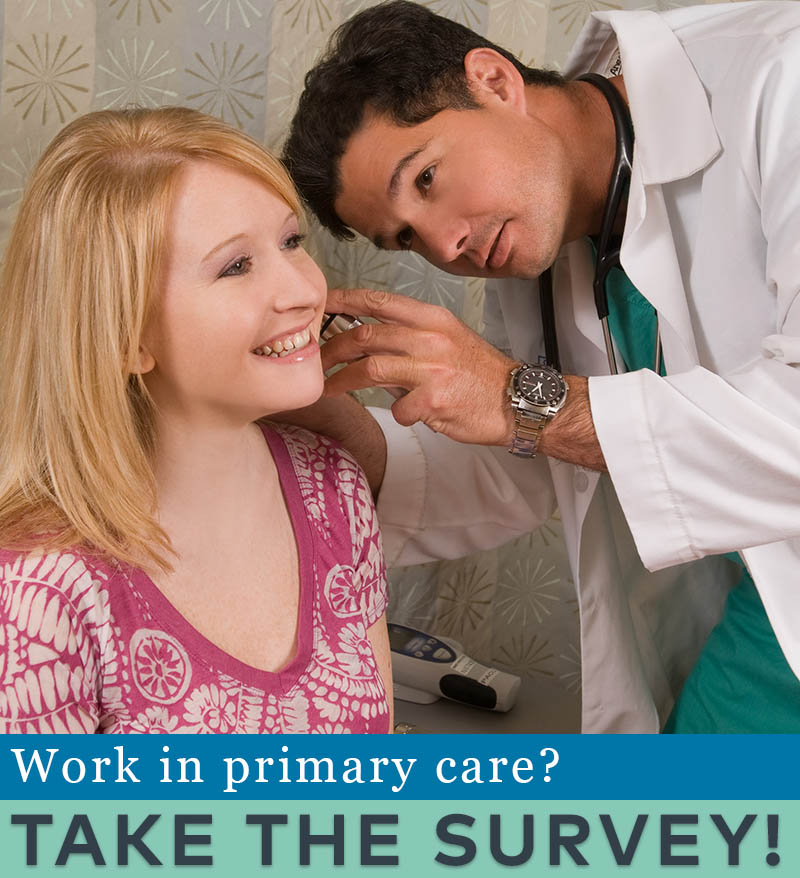You are looking at an archived version of our site. Please visit thepcc.org for a fresh, new experience!
You are here: Array » Survey of primary care ...
Survey of primary care clinicians shows increasing pressures on practices in their response to coronavirus
The Primary Care Collaborative, in partnership with The Larry A. Green Center, just released real-time survey results of primary care clinicians (conducted March 20-23), measuring the impact of COVID-19 on their practices.
“There’s a widespread willingness among patients to do telehealth visits, and that way of providing care keeps both patients and clinicians safe,” said Ann Greiner, President and CEO of the Primary Care Collaborative. “But there still are a large number of practices that say they’re not doing visits remotely—6 in 10 not doing video visits and 7 in 10 not doing e-visits. There are a lot of practices and patients who aren’t set up for telehealth yet.”
“Since last week’s survey, we saw a doubling or more of practices reporting that their frontline staff were out due to illness or self-quarantine,” said Rebecca Etz, PhD, Co-Director of The Larry A. Green Center and Associate Professor of Family Medicine and Population Health at Virginia Commonwealth University. “Almost half (46%) of the practices said a clinician was out, and many (44.5%) had a nursing staff member out.”
Topline analyses include:
- Nearly half (49%) are reporting that their practice is experiencing a “severe impact” (the highest possible response) due to the current status of COVID-19, and this amount has doubled since the previous week (when it was 21% choosing “severe impact”). Another 27% this week report “close to severe” impact.
- In terms of testing capabilities, less than half (43%) of respondents still report no capacity to test patients for COVID-19 at their practice. This is shows little change from last week. Another 39% report having capacity to test based on CDC guidelines/restrictions only.
- The biggest stressors on practices are now: 1) reduced well/chronic visits, and 2) staffing shortages due to staff illness/self-quarantine.
- As telehealth takes a more prominent role, respondents report high patient amenability to virtual services but much less certainty on how those services will be paid for.
- Only 46% of respondents reported that they believe the majority (60% or more) of their office visits/contacts are reimbursable.
This is the second consecutive week of this survey initiative. Results reflect input from over 500 primary care physicians, nurse practitioners, and PAs. Respondents spanned an even wider cross-section of the country this week, covering 48 states plus Puerto Rico and the Virgin Islands. A third own their practice, and nearly three-quarters (72%) work at a practice with more than three clinicians. Respondents ranged among practice types, including rural (17%), community health centers (18%), and practices associated with an academic medical center (34%).
For more details, read the executive summary and visit PCC’s webpage on this week’s survey results, which includes charts.
Experts are available to provide insight and comment on the survey. If you would like to speak with any of the experts listed below, please contact Stephen Padre, Communications Manager with the Primary Care Collaborative, at 202-417-3911.
Experts:
- Rebecca S. Etz, PhD, Co-Director of The Larry A. Green Center and Associate Professor of Family Medicine and Population Health at Virginia Commonwealth University
- Ann Greiner, President & Chief Executive Officer, Primary Care Collaborative

Are you a physician, nurse practitioner, or PA working in primary care?
Help PCC and the Larry A. Green Center track how your practice is responding to the COVID-19 outbreak by completing the Green Center's occasional survey.
The regular surveys are no longer being conducted.
COVID-19 Updates
February 10, 2022 | JAMA Network
January 26, 2022
December 17, 2021
December 14, 2021 | Primary Care Collaborative
December 10, 2021 | The Commonwealth Fund
- ‹ previous
- 2 of 39
- next ›
Recent News
August 16, 2024
August 12, 2024
July 16, 2024
Missed our May webinar, “The Commercial Market: Alternative Payment Models for Primary Care,” check out this clip!… https://t.co/mDZH3IINXK —
2 years 8 months ago
Did you catch @CMSinnovates' new #primarycare strategy? Thanks to concerted efforts from @NAACOSnews and other memb… https://t.co/mDnawqw8YW —
2 years 8 months ago
Not up to date on the #Medicaid Access and #Managedcare proposed rules important for #primarycare? No worries,… https://t.co/qB6sY3XCZ1 —
2 years 8 months ago
Secondary menu
Copyright © 2024 Primary Care Collaborative



